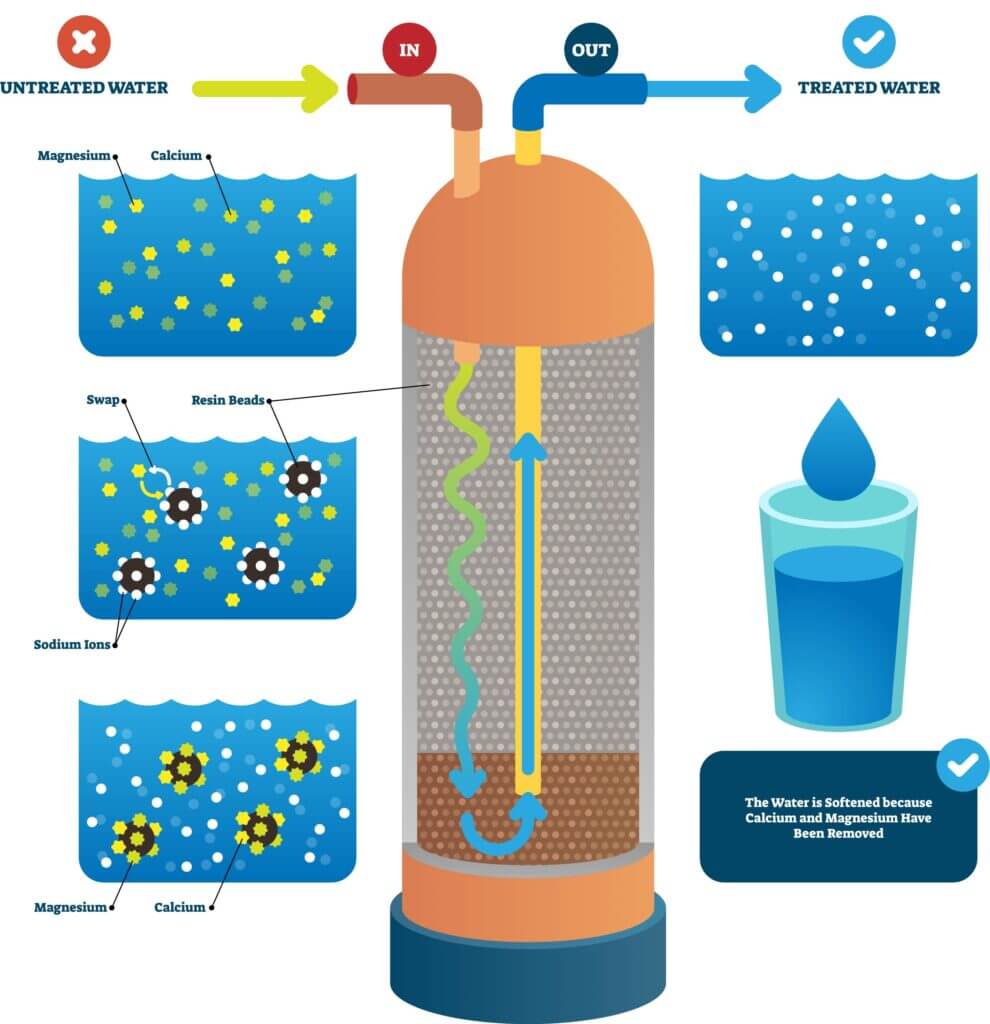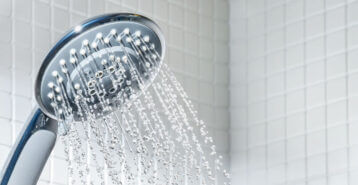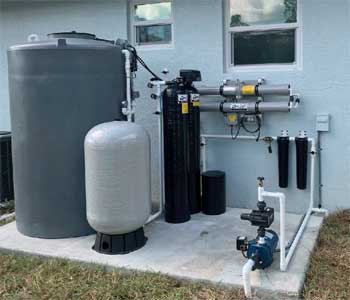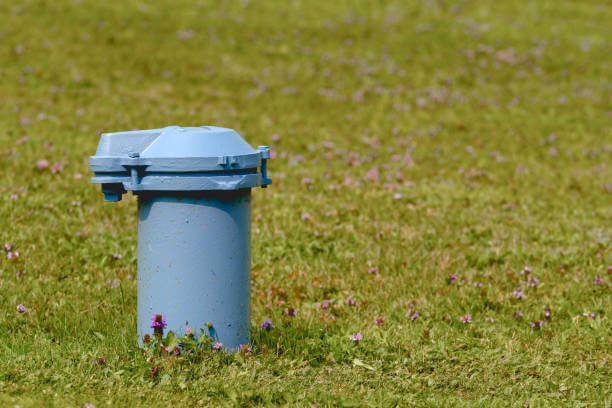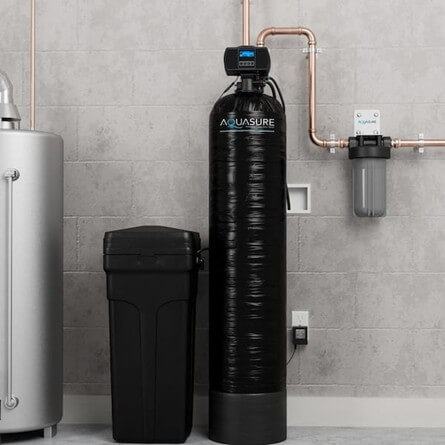What Is a Water Softener and How Much Does It Cost?
Hard water can create issues throughout your home — from shampoo that won’t lather to clothes that never feel fully clean to pipes that clog without warning. This mineral buildup makes water treatment an essential home upgrade. The good news: the right water softener can reduce hard water minerals, protect your plumbing, and improve your daily comfort. Below is a clear overview of what water softeners do, how to size one, and what you can expect installation to cost.
Do You Need a Water Softener System?
Short Answer: You likely need a water softener if you struggle with soap residue, dry skin, appliance staining, or frequent plumbing clogs.
You can test your water hardness with a kit, but many homeowners notice symptoms long before testing. Common signs of hard water include:
- Shampoo or soap that doesn’t produce enough lather
- Soap scum left behind when using bar soap
- Clothes that feel unclean even after washing
- Fading colors in clothing
- Dry hair and skin
- Stains on countertops, tubs, and inside appliances
- Clogged pipes, faucets, and showerheads
- Tap water with an unpleasant taste or odor
How Water Softeners Work
As water moves through municipal systems and into your home, it collects dissolved minerals. These minerals aren’t harmful to your health, but they do cause scale — residue that coats pipes, reduces water flow, and leaves a film on hair and skin.
Water softeners solve this by removing or neutralizing the minerals. Different systems — ion exchange, salt-free, magnetic, reverse osmosis — use different methods, but all aim to deliver softer, cleaner water for your home.
How Much Does a Water Softener Cost?
Most homeowners pay between $1,000 and $3,000 for a water softener, including installation. Units alone range from $300 to $7,000, depending on type, size, brand, and hardness levels.
Costs vary by system capacity, water hardness, home size, and location. Here’s a breakdown of what affects that price.
Water Softener Cost by Capacity and House Size
The size of your home and the number of people living in it determine the capacity you’ll need. Smaller descaler systems may cost around $500, while whole-house systems for larger homes can reach $7,000.
For reference, many four-person households need around a 24,000-grain capacity softener. “Grains” measure hardness on a scale typically between zero and 20. A score above six is considered hard water.
To find the right softener capacity, follow these steps:
- Calculate Your GPG Score: Determine your water’s grains per gallon (GPG).
- Estimate Water Usage:
- The average person uses about 90 gallons per day.
- Multiply the number of people in your home by 90.
- Example Calculation:
- 4 people x 90 gallons = 360 gallons per day
- 360 gallons x 11 GPG = 3,960
- 3,960 x 10 = 39,600 (ideal softener capacity)
So in this example, a four-person household with a GPG of 11 would need a system around 39,600 grains.
Here are typical costs by grain capacity:
- Up to 24,000: $300 to $600
- 24,000 to 32,000: $400 to $1,000
- 32,000 to 48,000: $500 to $1,200
- 48,000 to 64,000: $1,000 to $1,500
- 64,000 to 80,000: $1,200 to $1,800
- 80,000 to 96,000 or more: $1,500 to $2,500
These prices are for the unit only. Many homeowners will also need a licensed plumber for installation.
Water Softener Cost by Type
Water softeners come in several types. Here’s what to expect from each:
- Ion Exchange Systems: $400 to $3,000
The most common option. Water passes through sodium ions in a resin tank, exchanging hard minerals for soft ones. Available in single or dual-tank versions; requires regular salt refills. - Reverse Osmosis Systems: $1,000 to $11,000
Excellent for high mineral levels and often used with other systems. Small single-fixture setups may cost ~$100. - Magnetic Systems: $200 to $600.
Use magnetic fields to neutralize mineral ions. Best for areas with lower hardness. Commonly installed at one or two fixtures. - Salt-Free Systems: $500 to $4,000
Use potassium instead of sodium, ideal for low-sodium households. - Dual Tank Systems: $1,000 to $5,000
High-capacity, salt-based systems; ideal for large households. - Water Distiller Systems: $1,200 to $4,000
Boil water, condense vapor, and remove minerals, metals, and bacteria. Good for drinking water but not whole-home use.
» Related: Culligan Water Softener Cost
Water Softener Cost by Location
Your location influences price because water hardness varies by region. Areas with higher GPG scores may require larger or more frequent servicing.
To check your area’s hardness level, consult the United States Geological Survey.
Here’s how hardness levels typically affect capacity needs:
| Water Hardness | Recommended Capacity (Minimum) | Approximate Cost |
|---|---|---|
| 6 to 9 GPG | 24,000 grains | $300 to $600 |
| 10 to 12 GPG | 32,000 grains | $400 to $1,000 |
| 13 to 18 GPG | 48,000 grains | $500 to $1,200 |
| 18 to 20 GPG | 64,000 grains | $1,000 to $1,500 |
| 20 GPG or higher | 80,000 grains | $1,200 to $1,800 |
If your GPG score is above 20, expect more frequent servicing. Speak with a contractor or water treatment company for guidance.
What Other Costs Come With a Water Softener System?
- Installation: Usually $1,000 to $3,000, depending on system type and home layout.
- Labor: Varies by region; urban rates tend to be higher.
- Ongoing Maintenance:
- Water Filters: Under $100 each; replace every three to four months.
- Salt or Potassium Refills: Around $40 for salt or $60 for potassium every few months.
- Annual Maintenance: $150 to $900, depending on system type and size.
- Inspections and Permits: Required in some areas.
- Additional Plumbing: Extra work may increase overall cost.
- Lifespan: Most systems last up to 15 years before replacement.
» Related: Water Softener Repair Cost
Water Softener Costs: Final Thoughts
Installing a water softener can improve water quality, extend the life of your plumbing, and boost daily comfort. Prices range from $300 for basic units to more than $7,000 for high-capacity systems, with installation and maintenance adding to the total investment. By considering your home size, water hardness, and system type, you can choose a solution that provides long-term value and reliable performance.
» Related: Best Water Softener Brands of 2026
Compare top-rated water treatment pros in your area.
Read real homeowner reviews, explore qualifications, and view promotions. Modernize makes it easy to browse professionals and find one that will be perfect for your project.

